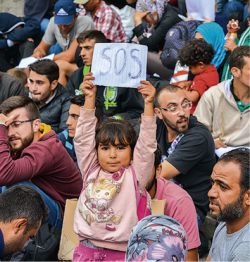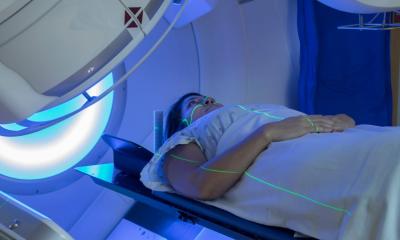Refugees
The major healthcare challenge
The refugee wave rolls on with no ebb in sight. For many, Germany remains their travel destination. In August and September alone, tens of thousands refugees arrived in Munich, presenting the Bavarian capital with a major challenge: How could the city provide initial medical care for everyone? While the German Asylum Procedure Act governs the appropriate procedures, in this unprecedented situation it was necessary for everyone involved to act quickly, efficiently and, most importantly, less bureaucratically.
Report: Anja Behringer

Due to its timely relevance, Dr Werner Schimana of the municipal health department was asked at short notice to speak at European Health Congress in Munich in early October. The paediatrician and adolescent medicine specialist reported how medical examinations are performed in tents at the central station in the course of registration, even before refugees are allocated to the initial processing facilities in the city and vicinity and then taken to other states. During this initial screening, teams containing two paramedics and a physician examine refugees; two teams can care for approximately 500-600 people within a 24-hour period.
Within three days an additional health examination is performed in the initial processing facilities. If need be, the refugees receive medical treatment, which is not always easy. Since both the federal and state authorities want to improve care of refugees, including healthcare, the draft Asylum Procedure (Acceleration) Act was adopted by the federal cabinet on 29 September 2015, with a supporting directive. As far as disease prevention is concerned, the states can also draw on the Robert Koch Institute and its ‘concept for implementation of early vaccination of asylum-seekers’.
Medical care with little bureaucracy
To provide non-bureaucratic assistance, the paediatrician Dr Mathias Wedeborn founded ‘Refudocs’, a Munich-based association that operates an acute treatment practice for refugees, financed outside the health insurance system. Since January, general practitioners, paediatricians, gynaecologists, and psychotherapists have been offering consultation five days a week in the initial processing facility at the Bayernkaserne for patients with acute illness, trauma or pregnancy.
They work on an hourly basis in addition to their regular work or, if retired, in the spare time. More than 70 physicians are on the association’s roster, which functions as the practice owner. ‘We are not only inexpensive. By virtue of our presence at the scene, we prevent many unnecessary emergency cases and hospitalisations,’ Wedeborn explained. Moreover, examination results are entered in a database so that they can be assigned to the person even after the refugee’s transfer.
The Oberbayern regional government, which assumed the start-up financing of this practice, pays Refudocs a contractually agreed, fixed hourly rate for medical service rendered. The association retains a portion to pay technical staff and practice overhead. The rest is paid to the physicians.
Immunisation: a first step toward prevention
At the beginning of October, the Robert Koch Institute (RKI) reported that there is currently only a very low risk of rare infectious diseases borne by asylum-seekers being imported into Germany. ‘Analyses of reporting data on infection incidents in the past years show that more than 90% of those who were ill were infected in Germany. That means the asylum-seekers are more of a group at risk than a risk to others.’
The institute also provides a list of infectious diseases uncommon there, which can occur among asylum-seekers – inter alia malaria, typhoid or relapsing fever. At the same time the Institute stresses that an outbreak of these diseases among the general population is very unlikely. Rather, many refugees suffer more from scabies incurred during flight, or from being in cramped quarters.
According to Schimana, current examinations show that less than 1% of the refugees tested positive for HIV or hepatitis. Approximately 1% has TBC infections, whereby the number of suspected cases is higher, ‘but that corresponds to the incidence among the German population and is manageable’. The next step in medical care to be performed is – nevertheless voluntary –vaccination, in accordance with the recommendations of the Standing Immunisation Commission (STIKO). Anyone who does not have a vaccination card is deemed un-vaccinated.
According to the Asylum Procedure Act, the senior state health authority determines the scope of examinations for communicable diseases to be performed on foreigners who have to live in an initial processing facility or communal accommodation. The law prescribes that these people must submit a physician’s certificate that there are no indications of infectious pulmonary TB. This certificate must be supported by a lung X-ray for all 15+year-olds (except those who are pregnant). That sums up the legal requirements.
However, according to RKI ‘The current high numbers of asylum-seekers presents the states with great challenges, also in organisation of health examinations, inter alia with regard to the required capacity for X-ray examinations. Hence there ought to be a technical reassessment of the procedure for thoracic X-ray exams of people 15 and older.’
Additionally, the Institute fears that a sharper increase in the illness is to be expected. It is estimated that one person suffering open tuberculosis – half of all new disease incidents – infects ten healthy people annually.
Another approach would be a triage using infection diagnostics (IGRA/ tuberculin skin tests) and a subsequent X-ray only if the test is positive. However, current test methods do not permit a distinction between active tuberculosis and latent TB infection (LTBI). Moreover, since the tests do not offer 100% sensitivity, a false negative finding is possible, even in a case of active TB. They are unsuitable for predicting the progression into a case of active TB.
11.02.2016





